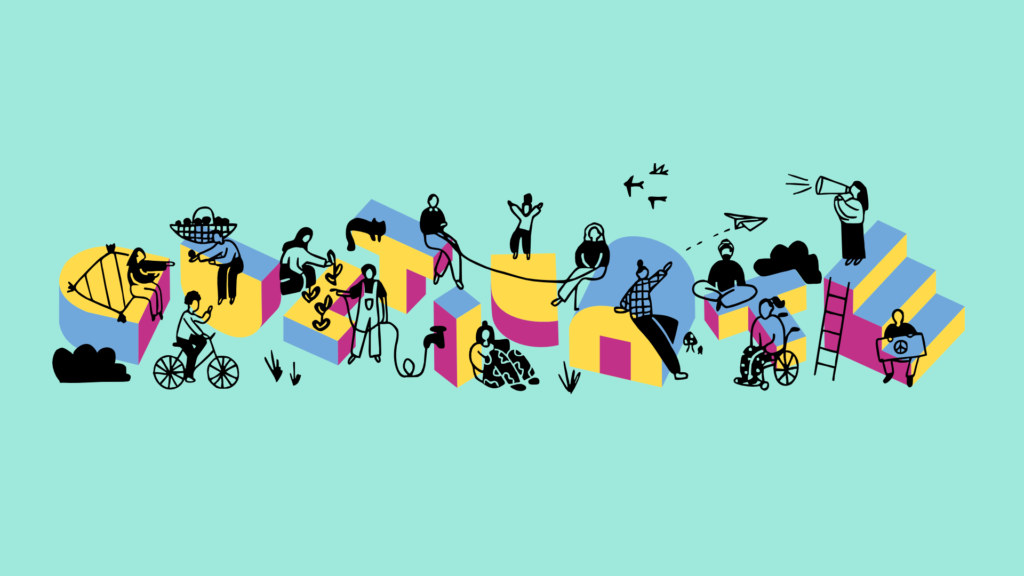
31.01.23

Victoria Beesley, Associate Director, Learning & Engagement at Perth Theatre and Perth Concert Hall, reflects on her time on the selection panel for CULTIVATE and the impact of a supportive recruitment process.
This blog was first published by Culture Collective on 19 January 2023.
In Autumn 2022, I sat on a panel with Claire Dufour (Creative Dundee) and Matthew Hickman (Culture Collective) to select four creative practitioners for Creative Dundee’s CULTIVATE project. These practitioners will partner with communities across the Tay Region to collaboratively explore new ways of embedding creativity at the core of collective action for climate justice.
It was one of the best selection processes I’ve experienced. It’s got me thinking much more about making selection processes not just a way of choosing individuals to collaborate with, but as opportunities to build relationships, to instil value in people, to encourage and to learn.
There were four commissions in total. Three focused on partnering with specific communities; one was for a practitioner who would tell the story of the whole project.
There were three stages to the selection process:
1. Initial application
Practitioners could apply in writing, audio or video. There was an opportunity to tell us about their work, provide examples of their work, and to outline their motivation for applying.
We used these applications to shortlist, selecting three practitioners to meet and interview for each commission.
2. Interviews
We met with the shortlisted practitioners to find out more about their work, their motivation, their connection to the communities they would be working with, their commitment to working collaboratively, and their interest in climate action.
These interviews happened over Zoom, applicants were sent the questions in advance, and were asked to begin with a short presentation about their work and reasons for applying.
As a panel, we did not discuss our reflections at this stage but waited until after the final stage to discuss each applicant.
3. Submission of a proposal
After the interview, practitioners were asked to send a proposal for how they intended to approach their chosen commission. This could take any form; and we received written proposals, images, PowerPoints and videos.
All of the practitioners were paid £150 to work on this proposal, as a recognition of the time it would take. References were also sought at this stage.
We, the panel, then looked over and assessed each proposal individually, before meeting together to discuss who would receive the commissions.
The process felt thorough and clear from start to end; and the different stages meant we got a really good insight into who the practitioners in front of us were and what they would bring to the project.
At this point I think it’s useful to say that I can only reflect on the process from my side of the process – as someone on the assessment panel – although Creative Dundee received a lot of positive feedback from the applicants too.
Here are the things I will take away from this process as being particularly useful or something to learn:
The forms our selection processes take are so important. Done well, the process of applying for a commission or a job can be beneficial, positive and enjoyable for both applicants and selection panels, and it can be part of forging really positive relationships.
I’m certainly going to keep thinking about what more I can be doing to create a positive recruitment process going forward, and I’m thinking about the ways I can go even further with this process.
What if everyone got a second shot at an interview if they weren’t happy with their first attempt? What if all interviews began with the applicant talking for ten minutes about any subject they were passionate about, to settle their nerves and to help the panel understand more about them as a person? What if everyone received a fee for the second-stage of a selection process? What if we spend more time curating the physical spaces we interview in to make interviewees feel as comfortable as possible? What if there was an opportunity for the interviewee to interview the panel as well?
Plenty of food for thought.
Victoria Beesley is Associate Director, Learning & Engagement at Perth Theatre and Perth Concert Hall; she is currently a Clore Fellow.
Read more about the full open call, application and selection process.
Discover more about CULTIVATE and meet the second round of creative practitioner commissions.

If you would like to support us in creating even better content, please consider joining or supporting our Amps Community.